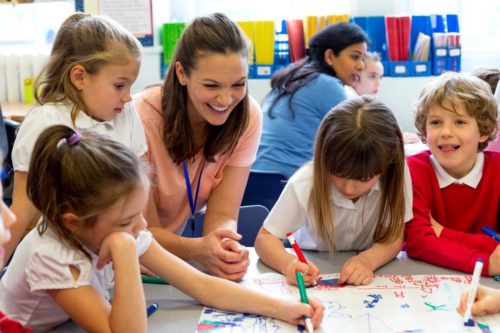Opis tego kierunku studiów w języku polskim:
https://studiawanglii.pl/courses/edukacja-dziecieca-psychologia/
Do you have a strong interest in supporting and working alongside children and their families? If so, this degree could be for you. You will engage with a broad knowledge base concerned with children and society, which will open up a wide range of opportunities in education, social and health services, community work and other diverse support work.
With a broad subject area covering 0 – 11 years, this course can open the door to a variety of careers with children and young people. Whatever direction you choose to take you will have the solid foundation of knowledge and understanding employers are looking for.
This degree provides a solid foundation in the understanding of childhood and an introduction to the psychology of childhood. It will explore aspects of human behaviour and interaction, and help you to understand why and how children may behave as they do.
Why study Childhood (Psychology) at Nottingham Trent University?
- 97% of our education and teacher training graduates are employed or engaged in further study six months after graduating (DLHE full-time undergraduate leavers 2016-17)
- If you complete your undergraduate degree, you are guaranteed an interview for a PGCE Primary teacher training course at NTU during your final undergraduate year (terms and conditions apply)
- We are supported by over 600 partnerships with local schools, colleges and organisations, ensuring our courses meet the demands of the competitive graduate market
- Many of our students choose to take a placement overseas. Recent placements have been available with a cricket project in Namibia, an international school in Brunei, an orphanage in Mombasa and an English language project in Thailand
- Excellent facilities and experienced and enthusiastic tutors.
Childhood degrees
There are three degree options enabling you to deepen your focus within a particular field of enquiry. These include:
- BA (Hons) Childhood: Learning and Development
- BA (Hons) Childhood (Psychology)
- BA (Hons) Childhood (Special Educational Needs and Inclusion)
Each degree has a number of shared modules.
Your career development
What skills will I develop?
A Childhood degree develops specific skills and knowledge around the subject of how children learn and develop. You will learn about the history and culture of childhood, as well as the major theories of social, emotional and cognitive development.
You will develop key transferable skills, including:
- written communication developed through writing essays;
- oral communication skills gained through reasoned debates during seminars and presentations;
- the ability to work as part of a team, though collaborative group work;
- research and analytical skills with the ability to judge and evaluate information;
- organisational and time management skills by prioritising tasks to ensure academic, social and work commitments are completed on time;
- negotiation, informally with peers and formally with staff;
- problem solving;
- IT skills.
How can I boost my career prospects?
Childhood graduates that go on to further study tend to take courses that lead to professional status. The most popular option is the postgraduate certificate in education (PGCE), as many graduates go on to work as primary or secondary school, early years or special needs teachers.
Other popular professional courses include nursing and postgraduate courses in social work. Employers are often supportive of further study and may support employees by providing funding or time off to complete coursework.
Your future career
A Childhood degree is an excellent foundation for careers working with children and young people in many sectors including health, education and social care.
Job options
Jobs directly related to your degree include:
- Early years teacher
- Family support worker
- Learning mentor
- Primary school teacher
- Special educational needs teacher
- Social worker
- Teaching assistant
- Youth worker
Jobs where your degree would be useful include:
- Child psychotherapist
- Children’s nurse
- Community development worker
- Counsellor
- Educational psychologist
- Speech and language therapist
Typical employers
Childhood graduates enter employment in a variety of sectors with a range of employers including local authorities, local and national charities, state and independent schools, nurseries, and health authorities.
Sure Start Children’s Centres and the National Health Service (NHS) also employ graduates from Childhood degrees.
Links with industry
We involve industry experts in our courses in a number of ways.
- We consult with employers when we design and update our courses.
- We ensure you are prepared to meet the demands of the workplace by continually checking the currency and validity of our courses with employers.
- You will have the opportunity to have a work placement (if not already in paid or voluntary employment).
- Employers may input directly into your course through guest lectures, projects, and other work-related activities.




















